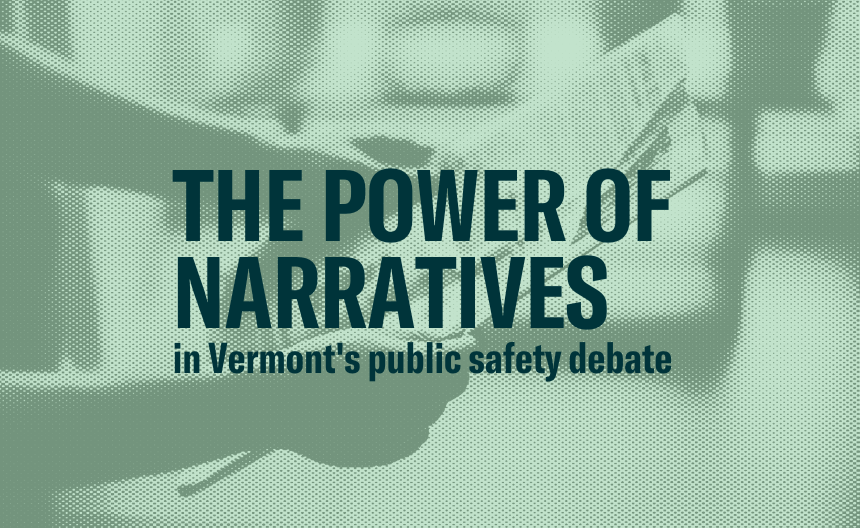To the members of the Vermont press corps,
We write to share our concerns about the local media coverage of public safety in Vermont. We offer this feedback with great respect for the essential role of the free press in our democracy and our state – ensuring our government is accountable to the people, and as a watchdog that can investigate and report on officials’ wrongdoing – and we offer these perspectives in the hope of supporting you in these difficult and essential tasks.
Vermont is consistently one of the safest states in the country, and an honest analysis of the data shows that, while they fluctuate, measures of public safety have generally improved over time, in Vermont and nationwide.
Meanwhile, amid a backlash against the Black Lives Matter movement and following years of progress on police accountability and criminal justice reform, much of Vermont’s recent media coverage on issues related to public safety and policing is overly simplistic, biased, and misleading.
Specifically:
- It is presented without sufficient context: historical perspective, statistical analysis, or basic data;
- It relies heavily on government and police sources and narratives without verifying their claims or providing equal time to contrary viewpoints;
- It frames complex issues in sensationalistic and misleading ways;
- It fails to respect the experiences of diverse constituencies, including those disproportionately and negatively impacted by policing and criminalization.
These shortcomings damage the quality of public discourse on these issues; distract from and reinforce structural inequities and systemic racism in our state; inflame legitimate concerns about public safety; and undermine the promulgation of data-informed public policies that make our communities safer and more just.
A recent New York Times article, ostensibly about bike theft in Burlington, is one example of this flawed and deeply problematic approach to crime reporting, but unfortunately it is not unique.
To better ensure more accurate and informative coverage of these critically important issues, we the undersigned respectfully ask that you take these concerns into account in your future reporting on criminal justice and policing, and that you consider the following:
- Historical context and data matter. [i] People’s feelings and perceptions about crime are real, and like direct experience, they matter – but they are also influenced and shaped by news coverage, particularly when key context, perspective, and data are omitted. Remember that the people of Vermont consistently and overwhelmingly support criminal law reform and police accountability. In approaching these complex issues, members of the media should not rely on anecdotes, one-off impressions, or government credentials, and should incorporate broader public opinion surveys, relevant data, and historical analysis.
- Police reports are frequently misleading and unreliable. [ii] News coverage should not amplify, “platform,” or rely on public officials’ press releases, statements, or legislative testimony without verifying facts, providing relevant context, or including contrasting viewpoints in roughly equal measure.
- Criminal justice reform enhances public safety. [iii] Evidence and experience show that punitive criminal justice policies are ineffective, inhumane, and costly, and have driven mass incarceration and perpetuated racial injustice for decades. By contrast, the data also shows that criminal justice reforms have improved public safety, reduced recidivism, and saved taxpayer dollars. In short, “reform” and “safety” should not be framed in opposition when they are not.
- Crime coverage is chronically biased. [iv] Consider evaluating the quantity and quality of your news organization’s crime coverage through a racial equity audit, including use of imagery and headlines. Please also examine how you engage with non-governmental sources. For example, consider in advance whether or not you are likely to include their contributions on an equitable basis with government officials, or at all.
We know the work you do is difficult and that the current media landscape is extremely challenging. We offer these suggestions in response to numerous specific instances in which local media coverage of public safety and policing has fallen short of the balanced and informative coverage Vermonters rightly expect and on which our state and our democracy relies. We want to support high quality reporting on these critically important issues, and hope you will receive this feedback in the spirit of goodwill with which it is offered.
Respectfully,
ACLU of Vermont
Ben & Jerry’s
Migrant Justice
Out in the Open
Outright Vermont
Pride Center of Vermont
Rights and Democracy
Rutland Area Branch of the NAACP
Vermont Public Interest Research Group
Windham Country Branch of the NAACP
Women’s Justice and Freedom Initiative
[i] Pew Research, What the data says (and doesn’t say) about crime in the U.S., https://www.pewresearch.org/fact-tank/2020/11/20/facts-about-crime-in-the-u-s/
[ii] American Bar Association, Police Reports Shouldn’t Set the News Agenda: A Guide to Avoiding Systemic Racism in Reporting, https://www.americanbar.org/groups/communications_law/publications/communications_lawyer/fall2020/police-reports-shouldnt-set-news-agenda-guide-avoiding-systemic-racism-reporting/
[iii] Brennan Center, Myths and Realities: Understanding Recent Trends in Violent Crime, https://www.brennancenter.org/our-work/research-reports/myths-and-realities-understanding-recent-trends-violent-crime
[iv] The Sentencing Project, 10 Crime Coverage Do’s and Don’ts, https://www.sentencingproject.org/app/uploads/2022/08/10-Crime-Coverage-Dos-and-Donts.pdf
Additional Resources:
American Progress, The Dangerous Racialization of Crime in the US News Media, https://www.americanprogress.org/article/dangerous-racialization-crime-u-s-news-media/
Arnold Ventures, Misleading Media Coverage Can Derail Data-Driven Criminal Justice Reforms, https://www.arnoldventures.org/stories/misleading-media-coverage-can-derail-data-driven-criminal-justice-reforms
Center for Journalism Ethics, A High Stakes Beat: Tips for Balanced and Informed Crime Coverage, https://ethics.journalism.wisc.edu/2020/01/27/a-high-stakes-beat-tips-for-balanced-and-informed-crime-coverage/
Fairness & Accuracy in Reporting, Publishing Police Press Release as Local ‘Crime’ Reporting, https://fair.org/home/publishing-police-press-releases-as-local-crime-reporting/
Fairness & Accuracy in Reporting, Media Muddled Midterms by Simplifying Crime’s Complexities, https://fair.org/home/media-muddled-midterms-by-simplifying-crimes-complexities/
Media Diversity Institute, How Journalists Cover Police Brutality is a Matter of Life and Death, https://www.media-diversity.org/how-journalists-cover-police-brutality-is-a-matter-of-life-and-death/
Media Matters, Fact Checking Fox News’ Narrative on “America’s Crime Crisis,” https://www.mediamatters.org/fox-news/fact-checking-fox-news-narrative-americas-crime-crisis
Media Matters, Recent Reporting on NYPD Conduct Shows Why Reporters Must Independently Verify Police Statements, https://www.mediamatters.org/black-lives-matter/recent-reporting-nypd-conduct-shows-why-reporters-must-independently-verify
NAACP Legal Defense Fund, The Truth Behind Crime Statistics, https://www.naacpldf.org/the-truth-behind-crime-statistics/
NPR, Stories About Crime Are Rife with Misinformation and Racism, Critics Say, https://www.npr.org/2022/11/08/1134550280/stories-about-crime-are-rife-with-misinformation-and-racism-critics-say
NY Daily News, The Media’s Police Brutality Blind Spots, https://www.nydailynews.com/opinion/ny-oped-media-police-brutality-blind-spots-20210422-4hszahjsnfh5npcw7e7eltowsi-story.html
Press On, Ethical Reporting on Police Violence and Black Led Resistance, https://medium.com/@lewispants/ethical-reporting-on-police-violence-and-black-led-resistance-tips-for-journalists-e575947cfb71
Vera Institute of Justice, Measuring Public Safety: Responsibly Interpreting Statistics on Violent Crime, https://www.vera.org/downloads/publications/for-the-record-measuring-public-safety_02.pdf
Vera Institute of Justice, Reimagining Prisons, https://www.vera.org/reimagining-prison-web-report/american-history-race-and-prison
William & Mary Law Review, The News Media's Influence on Criminal Justice Policy: How Market-Driven News Promotes Punitiveness, https://scholarship.law.wm.edu/cgi/viewcontent.cgi?article=1103&context=wmlr

